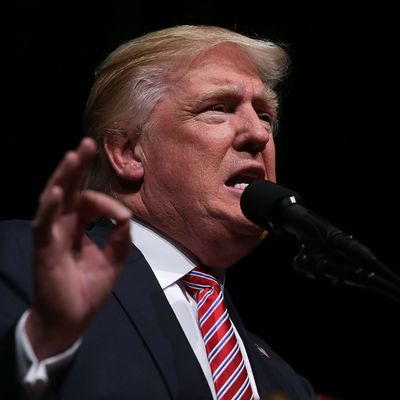
In recent days, Republicans like Paul Ryan, Kelly Ayotte, and John McCain have publicly scolded Donald Trump for smearing the parents of American Muslim and war hero Humayun Khan. They have not, however, retracted their endorsements of Trump for president, which they continue to depict as essential to prevent Hillary Clinton’s reign of tyranny. And so Trump tells the Washington Post’s Philip Rucker he has not yet decided to endorse them against their right-wing primary challengers.
Trump’s putative reasons for withholding support make about as much sense as his reasons for anything else he does. Trump claims he can’t support McCain because “He has not done a good job for the vets” — a hilarious use of McCain’s one unambiguously heroic trait as a reason not to trust him. Ryan is allegedly too lacking in “strong leadership”: “I like Paul, but these are horrible times for our country,” Trump said. “We need very strong leadership.” Trump even mimics Ryan’s own language from May, before his endorsement, when Ryan said of his still-pending decision to endorse, “I’m not there right now.” (Trump tells Rucker, “I’m just not quite there yet.”) With Ayotte, Trump does not know enough to make up a reason and simply says she “has given me zero support.”
While bizarre on its face, Trump’s behavior follows many of the principles that have guided his campaign to date. When faced with criticism of any kind, from either the media or other candidates, he lashes out almost automatically. Trump also believes in “leverage.” In the summer of 2015, he refused to promise to support the party nominee — because, he explained, he needed to dangle the possibility of withholding support in order to ensure fair treatment.
And the decision reflects Trump’s assessment of the relative power dynamics within the party. On the surface, Trump is playing a perilously weak hand. He now trails in the polls substantially, he creates toxic brand problems among racial minorities and college-educated whites, and other Republicans will be tempted to abandon him in order to escape his taint. But Trump views the situation the other way around. From where the nominee sits, he commands the loyalty of most Republican voters, if not their political or intellectual elite, and thus any Republican who crosses Trump also crosses most of his own base. In the wake of his showdown with the nominee in Cleveland, Ted Cruz saw his polling collapse and even donors desert him. Trump clearly believes that Ryan, Ayotte, and McCain are endorsing Trump because they need to do so for their own viability.
Trump’s actions reveal one other thing. If elected president, Trump will not be subject to restraint by Ryan or anybody else. His only mode of cooperation is dominance. A Trump presidency means a Trump party and a Trump state.






























